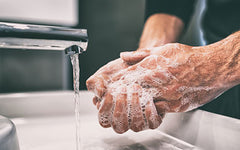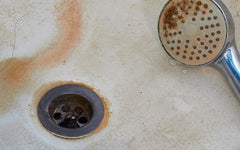If you’ve ever turned on your faucets at home and been surprised with a glass of brown water, you’re not alone. Sometimes you don’t get the clear, translucent drinking water you expect. Some tap water, from city water lines or well water systems, gets a brown tint or rusty water look to it.
Discolored water is likely a result of natural minerals leaching in from your water pipes or your water supply – and iron can often be the culprit. In fact, iron is one of the most common naturally occurring minerals on earth, and even treated groundwater retains some of this mineral. The iron concentration in wells and aquifers is typically between 0.5 and 10 milligrams per liter; in city drinking water, it’s often less than 0.3 milligrams per liter. In both cases, this amount is too small to create brown water.
There are factors that can intensify the iron levels in your water. If you don’t use a plumbing fixture regularly, the iron can build up and come out all at once. Strains on your neighborhood system – like a surge in demand or the flushing of fire hydrants (or a nearby use of hydrants for an emergency) – can lead to high iron content and brown water. Running your cold water for a bit or flushing out your water heater may alleviate the issue. If it doesn’t, it can be the sign of something more permanent. When iron is exposed to oxygen and moisture, it rusts – and this can lead to discolored water as well. Brown water can be the sign of a rusted pipe in your home or a worn out water line.
Keep in mind that low levels of iron can lead to discoloration that you’ll notice. For example, if you’re on a well system and start to see that your white clothes are coming out of the washing machine looking a bit brown – your water’s iron concentration may be at the higher end.
Is brown, rusty water safe to drink?
Damaging your clothes is one thing; drinking rusty water is another – and you may be wondering: is brown water safe to consume? While most water has some iron minerals in it, if you start to notice rusty water when you turn on your tap, you likely won’t want to drink it or use it for cooking. While it is likely safe to drink, rusty water will probably taste rusty as well. The rust particles causing the brown appearance will affect the quality of the water in a way you’ll notice. Plus, even if drinking rusty water is not a health concern, it is usually unpleasant.
If the rusty water looks the same or is getting worse, contact your water supplier to see if there is an issue within their system. You can also try flushing your system. Run all of your plumbing fixtures for several minutes – the aim is to flush out a few liters per fixture. Run your cold water first, followed by the hot to see if the rusty water is coming from one or both lines. If your water is still looking just as rusty, you can wait 24 hours and flush your system again. This can alleviate any issues coming directly from your water supplier. Of course, knowledge is power: testing your water will also help you determine what your water’s specific iron concentration is or point out if the rusty water is due to other contaminants.
Faucet water can come in a variety of unusual colors. Learn what each color means and if it's safe to drink.







